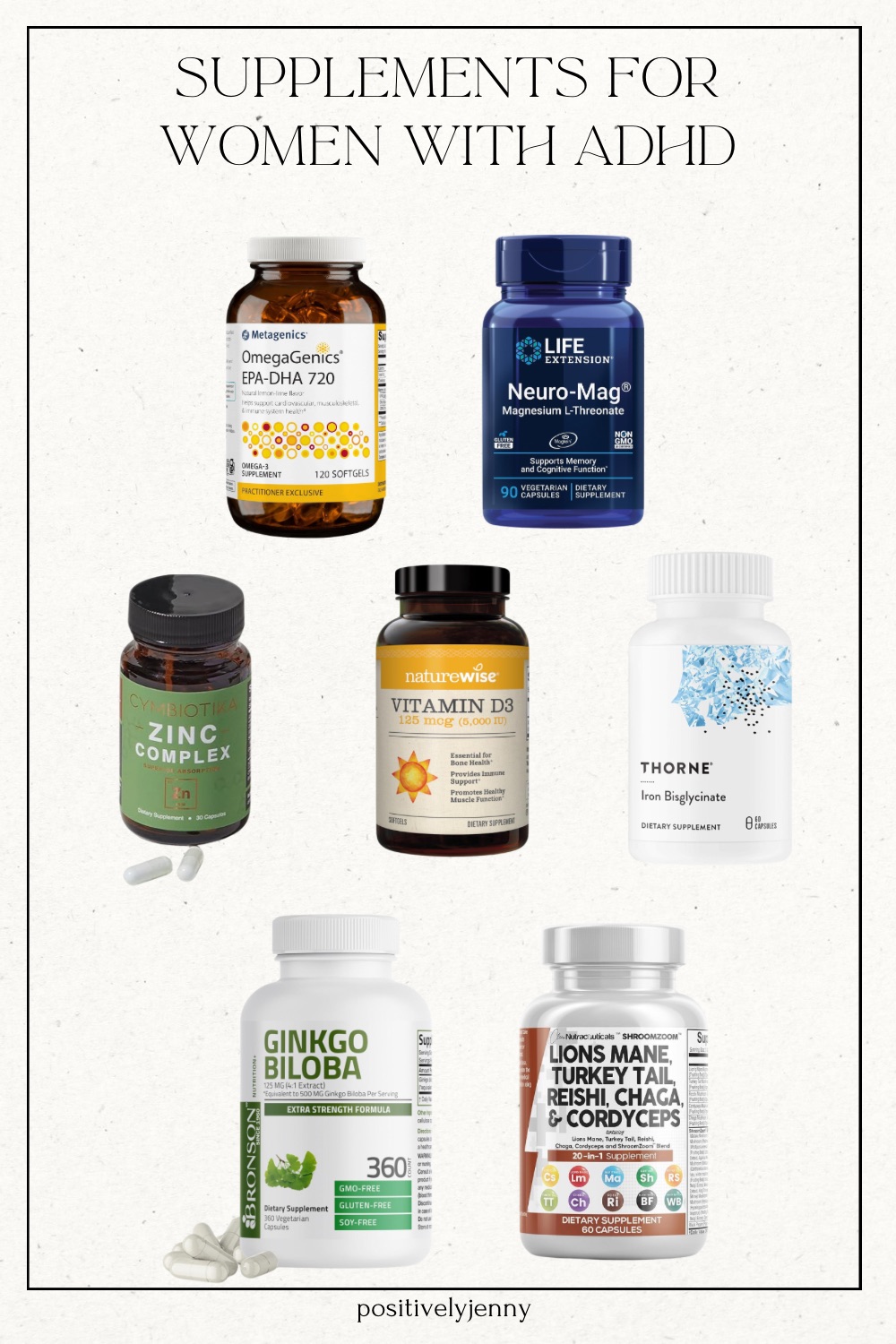Adult ADHD often manifests uniquely in women, encompassing traditional symptoms like distractibility and impulsiveness, alongside challenges such as heightened emotional responses and varying cognitive impairments. To navigate these complexities, many turn to a combination of therapies, lifestyle adjustments, and dietary supplements. These supplements can play a crucial role in enhancing neurotransmitter function, improving focus, and stabilizing mood. This guide delves into supplements that bolster cognitive function and emotional regulation, and outlines key lifestyle adjustments to consider for optimizing mental health and daily functioning.
Disclaimer: I am not a medical professional. This content is for informational purposes only and is not a substitute for professional medical advice, diagnosis, or treatment. Always seek the advice of your physician or other qualified health provider with any questions you may have regarding a medical condition.
Affiliate Disclosure: This article contains affiliate links. If you make a purchase through these links, I may receive a commission at no additional cost to you. This helps support our blog and allows us to continue bringing you valuable content.
Supplements to Enhance Focus and Mood Regulation in Adult ADHD:
- Omega-3 Fatty Acids:
Essential for brain health, Omega-3s, especially those rich in EPA and DHA, are known to enhance cognitive function and assist in regulating neurotransmitter pathways, which can improve attention and reduce impulsivity in ADHD. - Magnesium L-Theronate
This mineral has a calming effect on the nervous system, which can help mitigate anxiety and restlessness. It also plays a role in neurotransmitter function, promoting better focus and emotional balance. - Zinc:
Zinc modulates dopamine, a crucial neurotransmitter for focus and mood regulation, which is often dysregulated in individuals with ADHD. Adequate zinc levels can help improve cognitive function and emotional response. - Vitamin D:
Often overlooked, Vitamin D is vital for brain development and function. It supports the synthesis of neurotransmitters like dopamine and serotonin, enhancing mood and cognitive processes. - Iron:
Iron deficiency is common in women and can exacerbate ADHD symptoms. Iron is essential for producing dopamine, which is critical for attention and motivation. - Ginkgo Biloba:
Known for its cognitive-enhancing properties, Ginkgo Biloba can improve attention, executive function, and memory, which are often areas of concern for those with ADHD. - Medicinal Mushrooms:
Medicinal mushrooms, such as Lion’s Mane, are gaining recognition for their potential benefits in managing symptoms of ADHD. Lion’s Mane, in particular, is known for its cognitive-enhancing properties. It contains compounds that stimulate the growth of nerve cells and improve overall brain health, which can be particularly beneficial for those struggling with the focus and memory aspects of ADHD. This mushroom is also celebrated for its ability to support cognitive functions, including concentration, memory, and neuroplasticity. By enhancing nerve growth factor (NGF), Lion’s Mane may help improve the brain’s ability to process information more efficiently, making it a valuable supplement for those with ADHD. Cordyceps: Another powerful mushroom, enhances cellular energy production, which can boost stamina and reduce fatigue. For individuals with ADHD, who often experience energy dips and difficulty maintaining stamina for concentration, Cordyceps can offer a much-needed lift. Reishi: Known for its calming properties, Reishi can help manage anxiety and stress, common comorbidities in adults with ADHD. Its adaptogenic qualities can help stabilize the body’s response to stress, promoting better sleep and a more balanced emotional state. Chaga:Rich in antioxidants, Chaga supports immune health and reduces inflammation, which is beneficial as chronic inflammation can negatively impact brain function and exacerbate ADHD symptoms.
Lifestyle Adjustments to Enhance ADHD Management:
- Avoid Over-Caffeination:
Excessive caffeine can increase anxiety, disrupt sleep, and lead to increased heart rate and blood pressure, which may worsen ADHD symptoms. - Limit Sugar and Processed Carbohydrates:
These can lead to spikes and crashes in blood sugar levels, affecting energy and mood stability, crucial for managing ADHD. - Regular Physical Activity:
Exercise increases dopamine and serotonin levels in the brain, which helps improve mood and focus, essential for ADHD management. - Structured Sleep Routine:
Poor sleep can exacerbate ADHD symptoms. Establishing a consistent sleep schedule can help improve overall cognitive function and emotional regulation. - Mindfulness and Meditation:
These practices can reduce stress, improve emotional regulation, and enhance focus, making them beneficial for those managing ADHD.
While these supplements offer hope and potential benefits, they work best when integrated into a holistic approach that includes professional guidance, healthy lifestyle choices, and personal reflection. Remember, the path to managing ADHD is not just about alleviating symptoms but also about embracing a life of balance and well-being. Embrace this journey with openness, patience, and self-compassion, and know that you are not alone in this. Here’s to finding your harmony and thriving in every aspect of your life!



